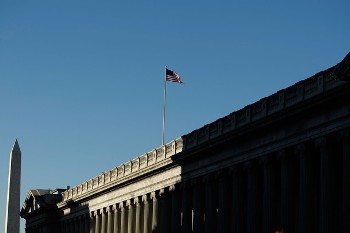U.S. Treasury allows full resumption of financial transactions with Sudan: minister
July 16, 2017 (KHARTOUM) – Sudan’s Minister of Finance Mohamed Salih al-Rikabi said Khartoum has received a letter from the U.S. Department of Treasury stating the full resumption of financial transactions between Sudan and international banks as of last Thursday.

President Donald Trump, in a new executive order issued Tuesday, moved that deadline back by three months, while keeping the temporary sanctions relief in place, citing the need to take more time to assess the robust process.
In an interview with the London-based Asharq Al-Awsat newspaper Sunday, al-Rikabi described the U.S. Department of Treasury letter as “significant breakthrough” in Sudan’s relations with the international financial sector and international institutions such as the IMF and the World Bank, foreign investors, as well as all Sudanese expatriates whose annual remittances are estimated at $6 billion.
He stressed his ministry would continue to deal with the regional and international financial institutions to attract foreign investments and achieve economic stability.
Commenting on Washington’s decision to delay the permanent lifting of economic sanctions, al-Rikabi said “despite dissatisfaction with the decision but it has achieved significant gains regarding the international financial transactions”.
He added the new executive order didn’t provide for additional restriction on President Obama’s decision to ease the sanctions.
Last May, the deputy governor of the Central Bank of Sudan (CBoS) Badr al-Din Qurashi acknowledged that Khartoum didn’t benefit from Washington’s decision to ease the economic sanctions saying investors look forward to seeing a full lift of sanctions in July.
He pointed that the international banks, especially U.S. banks, refrained from making transactions with their Sudanese counterparts, saying foreign investors fear to enter into large investments in Sudan before the full lifting of sanctions.
Qurashi added the sanctions have prevented the Sudanese banking sector and Sudanese citizens from using international payment and settlement systems and bank transfers, saying the banks were also prevented from acquiring advanced U.S technology.
(ST)
